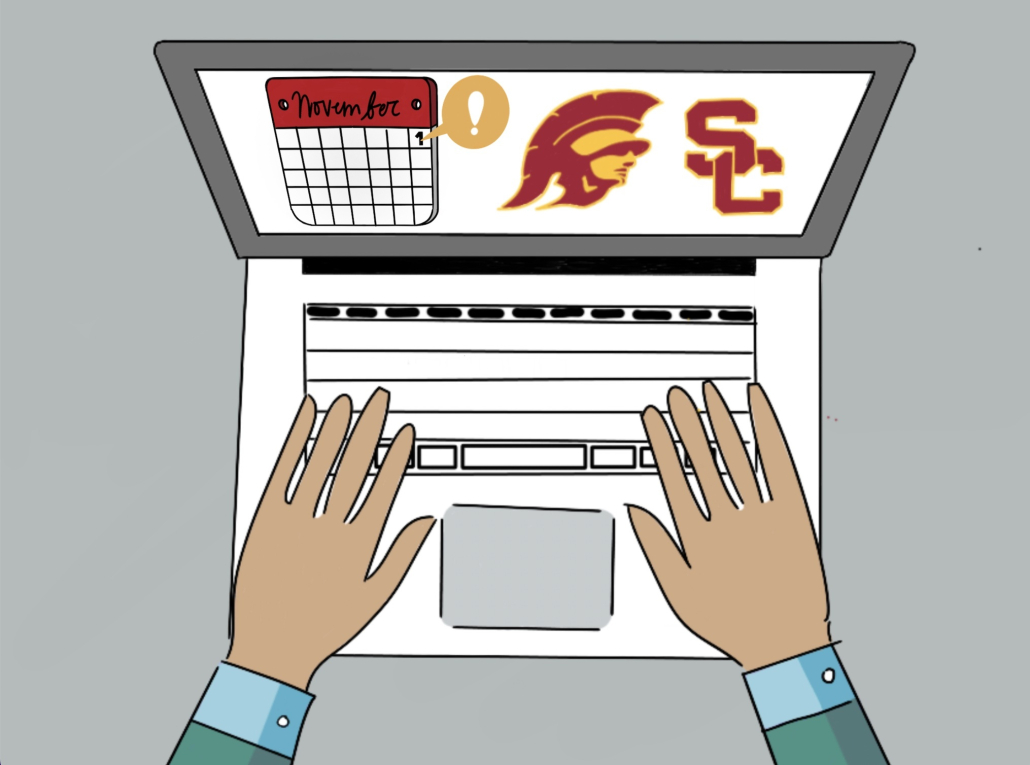USC adds early action admission option

USC has added an early action option for all future first-year applicants, beginning with the 2022-23 admission cycle. Individuals applying to USC under the new option — including merit scholarship applicants — have a deadline of Nov. 1, instead of the regular decision deadline of Jan. 15.
Prior to the change, all students applying to USC needed to submit applications by Jan. 15, with the exception being those applying to an arts program or for a merit scholarship, who were both required to submit their applications by Dec. 1.
Under the new application process, there are three application groups: merit scholarship applicants, special program applicants and regular decision applicants.
Merit scholarship applicants need to apply under the early action deadline of Nov. 1. Those applicants will be notified of their admission decision in mid-to-late January — admission to USC with the chance of earning a merit scholarship or a deferral to the regular decision pool.
Those applying to the arts or other special programs at USC, such as the Iovine and Young Academy, must submit their applications by Dec. 1. All applicants under this category, will also be considered for merit scholarships.
Applicants who are not applying for a merit scholarship or a special program must submit their applications by Jan. 15. Both special program applicants and regular decision applicants will be notified of their admission status by April 1.
Dean of Admission Timothy Brunold told the Daily Trojan that the University added this “formal” early action deadline mostly due to public opinion.
“For many years, many constituents … have expressed an interest in USC offering some sort of a formal early option, and we felt that early action is a much more responsible option than early decision,” Brunold said, noting that the “binding” nature of early decision did not align with what USC wanted for its applicants.
“We feel that it’s important that our applicants still have the flexibility to compare and contrast different colleges,” he said, “yet still have an opportunity to express their interest in USC by applying early.”
While Brunold said that the Office of Admission does not have a prediction as to how the addition of an early action option will affect acceptance rates and other statistics, he mentioned that the option may give USC earlier insights regarding the makeup of its incoming classes.
The University is interested in seeing whether the percentage of applicants who submit by the early deadlines — previously 60%, according to Brunold —will change when the formal early action deadline is added.
Brunold said the most significant impacts of the change are for the admissions and recruitment offices at the University. Applications will need to be read earlier; therefore, University recruitment activities will be held earlier as well — now in the spring instead of the fall.
“Traditionally, at USC, most of our in person high school visits, college fairs … have been done in the fall months, and then [the admissions and recruitment team] comes back to campus around Thanksgiving and begins reading applications,” Brunold said. “Now, with the earlier deadline, people will be coming back to campus, maybe in mid-October, and begin reading then.”
Cristian Cardona-Serrano, a freshman studying philosophy, politics and economics, said he’s “happy” that USC decided to add an early action option for future application cycles because the original policy caused some confusion for him and his peers. He noted that a few people he knew missed consideration for merit scholarships because of the lack of clarity surrounding the deadline.
“Once you have that official name,” Cardona-Serrano said, “it gets a little bit more serious. With the merit scholarship deadline, there’s no actual title to it … I knew a lot of people who just didn’t apply that day and were like ‘Oh, I’ll just do it on the regular deadline.’”
Cardona-Serrano said he has no hard feelings towards the fact that USC did not implement this earlier, though he said that he would have benefitted from the option when he applied last year.
“If I applied early and got the news early, that would have … made my choice for USC a lot easier,” Cardona-Serrano said. “But I’m happy that it’s going to be available for future applicants. What’s past is past, and I’m just glad USC is taking the steps forward for other students to have a much better application process.”
Daniel Pons, a freshman majoring in architecture, recommended potential applicants use the new early action option to express interest in USC. He did, however, note that there is one possible drawback to USC adding early action: it puts students who know they want to apply to the University at an advantage over those who don’t know if the school is right for them.
Pons said he wouldn’t have been able to apply early because of his parents’ immigration status.
“Given my parents were from Argentina, I was very unaware of the college application process and which colleges would best suit me,” Pons said. “ I did manage to apply early action to the schools I did want to apply early action to, but my fear is that for me, at least, [as] someone whose parents weren’t informed … I don’t know if I would have known about USC in time.”
Matt Strickland, a junior majoring in electrical and computer engineering, also said that they appreciate the new option, especially given the chances of deferral.
“I feel like it definitely gives a better chance for students who would usually not make it in the regular decisions round to have another chance to shine,” Strickland said.
Strickland recommends future applicants take advantage of early action as well.
“If you’re really dead-set on USC, I would just use all the chances you can get, so … definitely take early action,” Strickland said.

